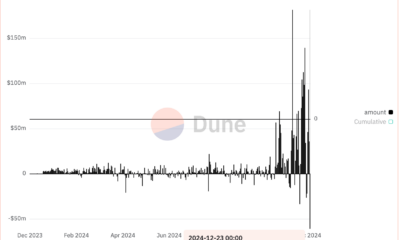legal
Tornado Cash Loses Motion to Dismiss
Published
3 months agoon
By
admin

The judge in the Tornado Cash case delivered an oral ruling today, rejecting both the Defense’s motion to compel discovery and their motion to dismiss the charges. This represents a massive setback for the Defense, and the judge’s reasoning may not bode well for developers and projects going forward.
Motion to Compel
The Defense’s motion to compel discovery sought to access a broad range of government communications, including exchanges with foreign authorities under the Mutual Legal Assistance Treaty (MLAT) and with domestic agencies like the Office of Foreign Assets Control (OFAC) and the Financial Crimes Enforcement Network (FinCEN). Citing Federal Rule of Criminal Procedure 16, the Defense argued that these materials were essential to understanding the government’s case and could potentially include exculpatory evidence. The judge, however, made it clear that Rule 16 imposes a stringent requirement: the Defense must show that the requested information is material to their case, not merely speculate on its potential usefulness.
The court dismissed the Defense’s arguments as speculative, noting that references to what the information “might” or “could” reveal do not meet the necessary standard for materiality. For example, the Defense argued that MLAT communications with the Dutch government might shed light on the evidence against Tornado Cash or reveal the government’s investigative theories. The judge found this reasoning unpersuasive, emphasizing that materiality cannot be established through conjecture or vague assertions.
The court similarly rejected the Defense’s request for all communications between the government and OFAC and FinCEN. Although the Defense claimed these documents were necessary to understand the government’s theories and potential witnesses, the judge concluded that the Defense failed to demonstrate how these communications were directly relevant to the charges at hand. The court reiterated that the burden is on the Defense to show a specific link between the requested documents and their defense strategy, a burden they did not meet.
When the Defense suggested an in-camera review—a private examination by the judge of the requested documents—to determine their materiality, the court refused. The judge argued that granting such a request based on speculative assertions would set a dangerous precedent, effectively forcing in-camera reviews in all criminal cases when a defendant speculates about the relevance of certain documents. This, the judge stressed, would undermine the purpose of Rule 16 and transform the pretrial discovery process into an unrestrained search for potentially helpful evidence.
The Defense also raised concerns under Brady v. Maryland, arguing that the government might be withholding exculpatory or impeachable evidence. While the court acknowledged the government’s obligations under Brady, it found no indication that these duties had been neglected. Without concrete evidence suggesting the government was withholding information, the court saw no reason to compel additional disclosures. The judge cautioned that while the Defense’s arguments were theoretically possible, they lacked the factual support needed to warrant the court’s intervention. She did say, however, that if she later finds that the government has “interpreted its obligations too narrowly” then there will be “unfortunate consequences for their case.”
Motion to Dismiss
The motion to dismiss presented a much more significant set of issues. Central to the Defense’s argument was the definition of a “money transmitter” under the Bank Secrecy Act (BSA). The Defense contended that Tornado Cash did not qualify as a money transmitter because it did not exercise control over users’ funds; it merely facilitated the movement of cryptocurrencies. The court, however, rejected this narrow interpretation. The judge clarified that the BSA’s scope does not require the control of the funds; Tornado Cash’s role in facilitating, anonymizing, and transferring cryptocurrency was sufficient to bring it within the statute’s ambit. The judge likened Tornado Cash to custodial mixers, which have been deemed money transmitting businesses.
Further complicating the Defense’s argument was their reliance on the 2019 FinCEN guidance, which uses a four-factor test to determine whether a wallet provider is a money transmitter. The Defense claimed this guidance, which includes a “total independent control” standard, should apply to Tornado Cash. The court disagreed, stating that this standard is specific to wallet providers and does not extend to mixers like Tornado Cash. Consequently, Tornado Cash’s lack of “total independent control” over funds was irrelevant to its classification as a money transmitter.
Another key point in the court’s analysis was the distinction between expressive and functional code under the First Amendment. The Defense argued that prosecuting Storm for his involvement with Tornado Cash was tantamount to punishing him for writing code, which they claimed was protected speech. The judge acknowledged that while code can be considered expressive, the specific use of code to facilitate illegal activities—such as money laundering or sanctions evasion—falls outside the bounds of First Amendment protection. The judge emphasized that the court must focus on the conduct enabled by the code, not merely the code itself. Even under intermediate scrutiny, which applies to content-neutral restrictions on speech, the judge found that the government’s interests in preventing money laundering and regulating unlicensed money transmission justified the restrictions imposed by the relevant statutes.
The court also addressed concerns about the immutability of Tornado Cash’s smart contracts, an issue raised by both parties. The judge acknowledged the existence of a factual dispute but noted that it was not a decisive factor in the current motion. However, the issue of immutability may play a role at trial in determining the extent of Storm’s control over the service and his responsibility for its operations.
In concluding remarks, the judge underscored that while the use of code to communicate ideas may be protected under the First Amendment, using that code to facilitate illegal activities is not. This distinction is critical in the context of emerging technologies like blockchain, where the line between speech and conduct can be blurred. The court’s ruling serves as a reminder that the legal system is prepared to hold participants in the digital economy accountable, even as it grapples with the complexities of applying traditional legal principles to new and evolving technologies.
The full transcript of the ruling will be released once prepared by the court reporter.
This is a guest post by Colin Crossman. Opinions expressed are entirely their own and do not necessarily reflect those of BTC Inc or Bitcoin Magazine.
Source link
You may like


Perp-Focused HyperLiquid Experiences Record $60M in USDC Net Outflows


Experts say these 3 altcoins will rally 3,000% soon, and XRP isn’t one of them


Robert Kiyosaki Hints At Economic Depression Ahead, What It Means For BTC?


BNB Steadies Above Support: Will Bullish Momentum Return?


Metaplanet makes largest Bitcoin bet, acquires nearly 620 BTC


Tron’s Justin Sun Offloads 50% ETH Holdings, Ethereum Price Crash Imminent?
Bitcoin
Early Bitcoin Investor Sentenced to Prison for Tax Evasion on $3.7 Million BTC Sale
Published
1 week agoon
December 14, 2024By
admin
An Austin, Texas man, Frank Richard Ahlgren III, has been sentenced to two years in prison for filing false tax returns that underreported the capital gains from selling $3.7 million worth of bitcoin, the United States Department of Justice (DOJ) announced today.
According to the DOJ, Ahlgren was an early Bitcoin investor who began purchasing bitcoin in 2011. In 2015, he acquired 1,366 bitcoins through his Coinbase account, a year in which the price of bitcoin peaked at approximately $495 per coin. By October 2017, Bitcoin’s value had surged, and Ahlgren sold 640 bitcoins for $5,807 each, totaling a gain of $3.7 million. He then used the proceeds to purchase a home in Park City, Utah.
However, when filing his 2017 tax return, Ahlgren misrepresented the gains by inflating the cost basis of his bitcoin purchases, claiming he had acquired the coins at prices higher than market rates. This misreporting significantly reduced the reported capital gains.
Between 2018 and 2019, Ahlgren sold additional bitcoins worth over $650,000 but failed to report these transactions on his tax returns entirely. In an attempt to conceal his gains, he transferred funds through multiple wallets, exchanged bitcoin for cash in person, and using mixers to anonymize his bitcoin transactions.
In total, the DOJ stated that Ahlgren’s actions resulted in a tax loss exceeding $1 million.
“Frank Ahlgren III earned millions buying and selling bitcoins,” said Acting Deputy Assistant Attorney General Stuart M. Goldberg of the Justice Department’s Tax Division “But instead of paying the taxes he knew were due, he lied to his accountant about the extent of a large portion of his gains, and sought to conceal another chunk of his profits through sophisticated techniques designed to obscure his transactions on the bitcoin blockchain. That conduct today earned him a two-year sentence.”
The U.S. District Court Judge Robert Pitman sentenced Ahlgren to two years in prison, followed by one year of supervised release. Additionally, Ahlgren was ordered to pay $1,095,031 in restitution to the U.S. government.
“Ahlgren will serve time because he believed his cryptocurrency transactions were untraceable. This case demonstrates that no one is above the law. My team at IRS Criminal Investigation has the expertise and tools to track financial activity, whether it involves dollars, pesos, or cryptocurrency,” said Acting Special Agent in Charge Lucy Tan of IRS-Criminal Investigation (IRS-CI)’s Houston Field Office. “This case marks the first criminal tax evasion prosecution centered solely on cryptocurrency. As the prices for cryptocurrency are high, so is the temptation to not pay taxes on its sale. Avoid the temptation and avoid federal prison.”
Source link
Alameda Research
Why did Caroline Ellison get such a light sentence?
Published
3 months agoon
September 25, 2024By
admin
Prosecutors and the defense alike argued Caroline Ellison should be sentenced to time served—and without her, the scale of Sam Bankman-Fried’s crimes may never have been uncovered.
Caroline Ellison was a key member of Sam Bankman-Fried’s inner circle, turning into a star witness against him during a high-stakes trial last year.
Ellison was the former CEO of Alameda Research, the sister trading firm of FTX, which collapsed in 2022 after a multibillion-dollar black hole emerged in the exchange’s finances.
A damning investigation later revealed that FTX customer funds had been used to make risky bets without the customers’ knowledge, with Alameda being given a secretive “backdoor” that allowed the hedge fund to withdraw seemingly endless amounts of money.
While she could have faced up to 110 years behind bars, an early guilty plea made it unlikely she’d spend the rest of her life in prison—and in a rare turn of events, both the prosecution and the defense called for her to be sentenced to time served.
At a courtroom in Manhattan on Tuesday, Ellison apologized to all those who lost money at FTX. She said “not a day goes by” where she doesn’t reflect on the harm caused to the many innocent victoms.
“The human brain is truly bad at understanding big numbers. I participated in a criminal conspiracy that ultimately stole billions of dollars from people who entrusted their money with us.”
Ellison
In a sympathetic note to Judge Lewis Kaplan, prosecutors praised her “extraordinary cooperation with the government” and said this should be reflected in her punishment. The note concluded:
“The government cannot think of another cooperating witness in recent history who has received a greater level of attention and harassment. The attendant professional consequences of this level of notoriety are obvious and unlikely to be shortlived. Throughout, however, and certainly during her testimony, Ellison steadfastly remained candid and dedicated to telling the truth—as embarrassing as it often was for her—and in assisting with bringing the most culpable party to justice.
At the hearing, the judge declared that Ellison had been “very incriminating of herself,” consistent in her testimony, and a 110-year term would be “absurd.”
However, the judge concluded that she was “by no means free of culpability” and sentenced her to two years in prison.
Why prosecutors praised Ellison
Faced with Bankman-Fried’s “systematic destruction of evidence,” prosecutors argued that Ellison provided “credible and detailed information” about her significant role in his crimes, allowing them to establish a clearer picture of his wrongdoing.
It was also noted that Ellison had cautioned SBF against Alameda’s aggressive borrowing, predicting that the firm would eventually have to use FTX funds if the market turned.
“As FTX collapsed, Bankman-Fried persisted in publicly denying knowledge and fault. Ellison, on the other hand, expressed relief that the fraud was exposed, and responsibility for her wrongdoing,” prosecutors wrote in their sentencing remarks. The judge agreed that she had cooperated fully, while Bankman-Fried was “the opposite.”
After making her way through an almighty paparazzi scrum during the three days she gave evidence, Ellison spoke of her on-off relationship with SBF, directly accused him of committing crimes, and claimed his unkempt appearance was a deliberate attempt to boost FTX’s image.
Her testimony played a pivotal role in Bankman-Fried’s conviction and subsequent 25-year prison sentence for defrauding customers and investors. He is currently appealing his punishment.
Pointing out that many of the allegations would have been difficult to prove without her help, prosecutors added: “The timeliness of Ellison’s cooperation contributed to the speed with which the government was able to indict Bankman-Fried, ensuring that he did not flee the Bahamas or further obstruct the government’s investigation.”

While some argue that Ellison’s sentence is unduly lenient, prosecutors emphasized that she would face consequences for years to come.
They noted that Bankman-Fried had leaked her private writings to The New York Times in an attempt to undercut her testimony — and delicate details she had shared to a therapist had ended up appearing in Going Infinite by Michael Lewis. Prosectuors wrote last week:
Her physical appearance was scrutinized and criticized, and she was mocked in memes and other content on social media. Numerous films and TV shows are in production about the downfall of FTX, which will only perpetuate the public scrutiny Ellison has faced to date … the attendant professional consequences of this level of notoriety are obvious.
Ellison’s lawyer added that their client “will carry shame and remorse to her grave” — and Bankman-Fried had a direct role in warping her moral compass.
Anjan Sahni went on to note that she was also affected when FTX suddenly suspended withdrawals and careened into bankruptcy, as “the vast majority of her savings” were on this platform.
“She will never profit from her role in this crime,” Sahni added.
Ellison, who turns 30 in November, was portrayed as someone focused on rebuilding her life through volunteering and writing a math textbook. It is unlikely she will retain any of the earnings she made at Alameda Research. Her legal team wrote:
Caroline’s participation in the criminal conspiracies at Alameda Research is a dramatic departure from her otherwise law-abiding nature. She poses no risk of recidivism. Sending Caroline to prison is entirely unnecessary, either for specific deterrence or to safeguard the public. Caroline is unlikely to reoffend because she did not commit these crimes out of greed.
There is no discounting the seriousness of Ellison’s crimes or her role in damaging the financial health of countless FTX customers. But in the eyes of both the prosecution and the defense, she was also crucial in untangling the mess that followed.
Almost two years on, and 98% of those owed money by this doomed exchange are receiving their initial investments in full — along with an additional 18% on top as compensation.
The outcome could have been very different had Ellison not cooperated so closely—reflected in the sentence she received.
Source link
legal
Samourai Developers Appear Together In Court For First Time At Status Conference
Published
3 months agoon
September 17, 2024By
admin

Today, Samourai Wallet developers Keonne Rodriguez and William Lonergan Hill appeared together in court in the Southern District of New York for a status conference.
This was the first time the two made a public appearance together since the US Department of Justice (DoJ) charged the two developers with conspiracy to commit money laundering and conspiracy to operate an unlicensed money transmitting business in April 2024. It was also the first time either of them have appeared in court since Hill appeared ahead of his bail release in July and Rodriguez first attended a court hearing in May.
The prosecution addressed the court first, stating that it had produced “voluminous batches of discovery.”
It made the first batch available to the defense in mid-June 2024. This batch featured business records, emails and social media account information amongst other data.
The second batch, which it made available to the defense in mid-August 2024, featured data extractions from the devices that the DoJ seized from the two developers. The DoJ has extracted information from 15 of the 44 devices seized from Rodriguez and 25 of the 27 devices seized from Hill.
The prosecution also stated that it would produce a third batch of discovery containing a “relatively modest” amount of data soon and that it was prepared to proceed with trial.
No Evidence Of Money Transmission
Rodriguez’s attorney made the case that it was premature to set a trial date, as the defense has yet to review all of the discovery made available in mid-August 2024. The defense also said that it has yet to come across any evidence showing that Rodriguez or Hill operated an unlicensed money transmitting business.
Hill’s attorney stated that they’ve received 8 terabytes worth of discovery. To put this amount of data in context, he explained that this was the equivalent of 75% of the amount of information in the Library of Congress and that, if one printed this information, one could stack the paper it was printed on “to the moon and back 22 times,” making the point that it would be hard to sort through and review.
Hill’s attorney also referenced the letter from Senators Cynthia Lummis (R) and Ron Wyden (D) in which the lawmakers stated that the DoJ’s unprecedented interpretation of the US Department of the Treasury’s Financial Crimes Enforcement Network (FinCEN) statute regarding operating an unlicensed money transmitting business contradicts the intent of the rule. For this reason, he proposed a motion to dismiss the charge.
The judge denied this request and scheduled a follow-up hearing for December 17, 2024 at 10 AM ET.
Rodriguez’s Request For Bail Modifications
In the second portion of the conference, Rodriguez’s lawyer requested two modifications to Rodriguez’s bail conditions. He requested that the court remove Rodriguez’s home detention mandate and that the court modify restrictions on Rodriguez’s ability to transact with cryptocurrency, some of which was proceeds from Samourai. (Zack Shapiro, Legal Fellow at the Bitcoin Policy Institute (BPI) later explained to me that the second modification was requested in part so that Rodriguez could use bitcoin proceeds from Samourai to pay for legal fees.)
Rodriguez’s attorney argued that home detention was “unduly restrictive” and “unnecessary,” and that Rodriguez isn’t a flight risk. The defense also cited two instances in which Rodriguez had the opportunity to flee but didn’t in its efforts to make the case that Rodriguez no longer needed to wear a location monitoring device.
The prosecution pushed back, arguing that Rodriguez’s home detention was necessary to ensure that Rodriguez continued to appear for trial. It also stated that the charges being levied against Rodriguez for running a “cryptocurrency money laundering business” were severe and that Rodriguez was potentially facing a potential sentence of up to 25 years.
The prosecution went on to cite evidence from handwritten pages that it had obtained from Rodriguez’s home containing details about how he would flee the country to a jurisdiction from which it would be difficult to extradite him. This information included a list including different passports as well as having $10,000 in cash, a burner phone, an unused SIM card, and various mnemonic phrases for crypto assets amongst other items.
Rodriguez’s lawyer argued that this plan applied to what Rodriguez would do in the case of a more general emergency, while the prosecution argued that this was Rodriguez’s current escape plan.
The prosecution stated that it was “a pretty good plan” and that it doesn’t feel that it’s appropriate to stop monitoring Rodriguez at this time. However, the prosecution did say that it would consider allowing Rodriguez certain freedoms if petitioned, without including any specifics.
The judge didn’t allow for the modification of the bail conditions and asked both the prosecution and the defense to “get moving on the case.”
Donate to the legal defense fund for Rodriguez and Hill via BPI’s P2P Rights Fund.
Source link

Perp-Focused HyperLiquid Experiences Record $60M in USDC Net Outflows

Experts say these 3 altcoins will rally 3,000% soon, and XRP isn’t one of them

Robert Kiyosaki Hints At Economic Depression Ahead, What It Means For BTC?

BNB Steadies Above Support: Will Bullish Momentum Return?

Metaplanet makes largest Bitcoin bet, acquires nearly 620 BTC

Tron’s Justin Sun Offloads 50% ETH Holdings, Ethereum Price Crash Imminent?

Investors bet on this $0.0013 token destined to leave Cardano and Shiba Inu behind

End of Altcoin Season? Glassnode Co-Founders Warn Alts in Danger of Lagging Behind After Last Week’s Correction

Can Pi Network Price Triple Before 2024 Ends?

XRP’s $5, $10 goals are trending, but this altcoin with 7,400% potential takes the spotlight

CryptoQuant Hails Binance Reserve Amid High Leverage Trading

Trump Picks Bo Hines to Lead Presidential Crypto Council

The introduction of Hydra could see Cardano surpass Ethereum with 100,000 TPS

Top 4 Altcoins to Hold Before 2025 Alt Season

DeFi Protocol Usual’s Surge Catapults Hashnote’s Tokenized Treasury Over BlackRock’s BUIDL
182267361726451435

Why Did Trump Change His Mind on Bitcoin?

Top Crypto News Headlines of The Week

New U.S. president must bring clarity to crypto regulation, analyst says

Will XRP Price Defend $0.5 Support If SEC Decides to Appeal?

Bitcoin Open-Source Development Takes The Stage In Nashville

Ethereum, Solana touch key levels as Bitcoin spikes

Bitcoin 20% Surge In 3 Weeks Teases Record-Breaking Potential

Ethereum Crash A Buying Opportunity? This Whale Thinks So

Shiba Inu Price Slips 4% as 3500% Burn Rate Surge Fails to Halt Correction

Washington financial watchdog warns of scam involving fake crypto ‘professors’

‘Hamster Kombat’ Airdrop Delayed as Pre-Market Trading for Telegram Game Expands

Citigroup Executive Steps Down To Explore Crypto
Mostbet Güvenilir Mi – Casino Bonus 2024

NoOnes Bitcoin Philosophy: Everyone Eats
Trending

 3 months ago
3 months ago182267361726451435

 Donald Trump5 months ago
Donald Trump5 months agoWhy Did Trump Change His Mind on Bitcoin?

 24/7 Cryptocurrency News4 months ago
24/7 Cryptocurrency News4 months agoTop Crypto News Headlines of The Week

 News4 months ago
News4 months agoNew U.S. president must bring clarity to crypto regulation, analyst says

 Price analysis4 months ago
Price analysis4 months agoWill XRP Price Defend $0.5 Support If SEC Decides to Appeal?

 Opinion5 months ago
Opinion5 months agoBitcoin Open-Source Development Takes The Stage In Nashville

 Bitcoin5 months ago
Bitcoin5 months agoEthereum, Solana touch key levels as Bitcoin spikes

 Bitcoin5 months ago
Bitcoin5 months agoBitcoin 20% Surge In 3 Weeks Teases Record-Breaking Potential



